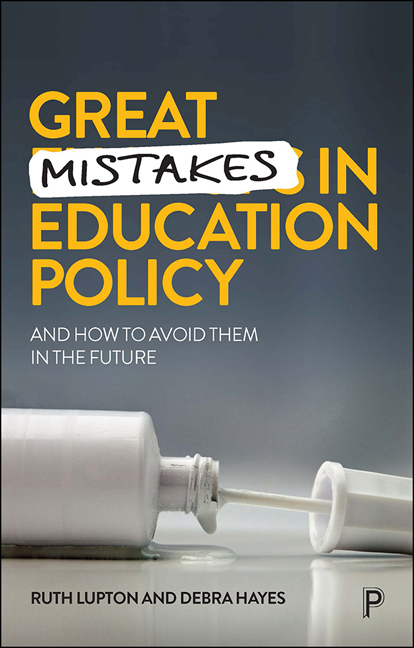Book contents
- Frontmatter
- Contents
- List of tables and boxes
- List of abbreviations
- Notes on the authors
- Acknowledgements
- 1 Introduction
- 2 Setting the scene
- 3 Tests, tests, tests
- 4 Schooling that works for some but not for others
- 5 Teachers making less of a difference
- 6 Mistake #1: turning to the market
- 7 Mistake #2: letting test scores drive policy
- 8 Mistake #3: over-prescribing teachers’ work
- 9 Mistake #4: misunderstanding educational inequalities
- 10 Mistake #5: leaving education out of education policy making
- 11 Synthetic phonics: a ‘perfect storm’ of policy mistakes
- 12 There are alternatives
- References
- Index
12 - There are alternatives
Published online by Cambridge University Press: 23 December 2021
- Frontmatter
- Contents
- List of tables and boxes
- List of abbreviations
- Notes on the authors
- Acknowledgements
- 1 Introduction
- 2 Setting the scene
- 3 Tests, tests, tests
- 4 Schooling that works for some but not for others
- 5 Teachers making less of a difference
- 6 Mistake #1: turning to the market
- 7 Mistake #2: letting test scores drive policy
- 8 Mistake #3: over-prescribing teachers’ work
- 9 Mistake #4: misunderstanding educational inequalities
- 10 Mistake #5: leaving education out of education policy making
- 11 Synthetic phonics: a ‘perfect storm’ of policy mistakes
- 12 There are alternatives
- References
- Index
Summary
The end of an era
The educational policies discussed in this book are often described as constituting a distinctive era in which the principles of market liberalism have framed and structured education systems and practices around the world, often in tandem with social and cultural conservatism. A broad political consensus, within and between countries, has supported the development of market-driven systems characterised by standards-based education reforms, test-based accountability, reduced teacher autonomy, and back-to-basics curriculum projects.
This era is coming to a close. In the decade following the 2008 global financial crisis, as the fragility and failure of the neoliberal economic model came into sharp relief, cracks in the educational consensus began to show. Referenced throughout the book, multiple inquiries and reports, including those from parliamentary committees and government-appointed bodies, began to point out that in various ways the twin goals of excellence and equity were not being achieved. England and Australia were not improving in international league tables either of education or economic performance. Places and people were being left behind as governments struggled to manage rapid transitions and shocks fairly, leading to increasing political and social divisions. Social mobility was barely increasing and inequalities in educational experiences and outcomes barely reducing. Social stratification seemed built into systems. Markets and tests were producing more negative than positive effects overall. Schools were becoming less positive and productive places for many young people. Ideas of what might entail a ‘fair and equal education’ that privileges the interests of all young people in diverse contemporary nations seemed to have been lost (Hattam et al, 2018). In England in 2019, for the first time in decades, the major political parties presented radically different education manifestos, with opposition parties proposing scrapping tests, broadening the curriculum, replacing Ofsted, giving more power to local authorities, preventing the expansion of grammar schools, and taking steps to bring private schools into the state system. In Australia in the same year, at the federal election, Labor tentatively attempted to more firmly distinguish its funding policy from that of the coalition, testing electoral political support for a more needs-based approach to federal funding. It lost too, but the tide was starting to turn in both countries.
- Type
- Chapter
- Information
- Great Mistakes in Education PolicyAnd How to Avoid Them in the Future, pp. 145 - 158Publisher: Bristol University PressPrint publication year: 2021

